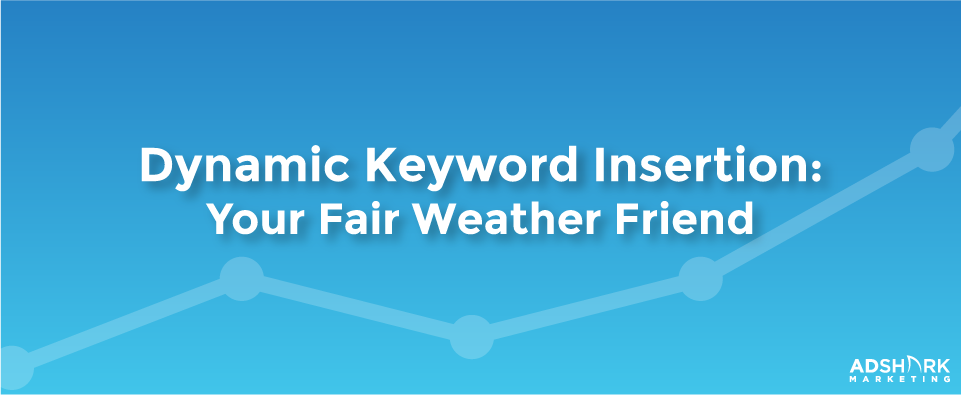Dynamic Keyword Insertion – Your Fair Weather Friend
Dynamic keyword insertion (DKI) is the practice of generating ad copy based on a user’s search query. The user’s search query must be a match for one of the keywords you’re targeting within that adgroup.
How Do I Set Up An Advertisement With DKI?
It’s relatively straightforward. Let’s say I run a shop that sells Star Wars memorabilia and want to run a paid search campaign with Google Adwords.
I’m going to create a group of search terms to target using phrase match, exact match, and broad match modified. I rarely use broad match keywords, as they tend to bring in irrelevant clicks, hurting the campaign’s performance.
Using the Adwords interface, your ad group should look something like this:

That adgroup is fine for our example. The one exception is “bill’s star wars shop.” That keyword is an example of targeting users who are searching for your competitor’s brand and trying to convert them into your own customers.
Once your adgroup has been created and budgets have been set, you can create a text ad using DKI. Your ad would look something like this:

Inserting {KeyWord:Star Wars Toys} into my headline brings up DKI. As an example, if someone searched “Luke Skywalker Toys,” that would dynamically be placed in the headline. Having an exact match of the user’s search query in the headline of your text ad will bring higher click-through rates.
If any of the keywords in your adgroup are longer than the 25 characters allowed by Adwords headlines, the text ad will default to the keyword between the { } symbols.
You can control capitalization of your dynamically inserted headline by changing the {KeyWord} part of your ad.
Here’s how your ad would display if you changed the capitalization of your DKI.
• keyword= “star wars toys”
• Keyword= “Star wars toys”
• KeyWord= “Star Wars Toys”
• KEYWORD= “STAR WARS TOYS”
The Pros and Cons of Dynamic Keyword Insertion
Pros:
• Can increase click-through rates by putting the user’s exact search query into the headline.
• Decreases the amount of time and thought needed to perfect a text ad. This can be valuable for businesses with large Adwords accounts, saving both time and money.
• On average, text ads using DKI see higher engagement than those with normal headlines.
Cons:
• Using DKI can get you sued if you’re not careful. In my example of targeting a competitor’s brand, “bills star wars shop,” the headline of your ad would read with his store’s name. Definitely not a best practice.
• Rarely are the best-performing ads using DKI. While on average DKI can outperform most other ads, they are rarely, if ever, the best-performing ads on Adwords.
• Ad text can sometimes be ludicrous. eBay is well known for using DKI in a really, really bad way. Here are some examples:



If you’re going to use DKI, my recommendation is to keep your adgroups tightly organized and don’t use a lot of keywords per adgroup. Make sure that your ad text will read well using all of your targeted keywords. Also, don’t use broad match keywords. Use exact match, phrase match, and broad match modified.
Don’t be like eBay, the butt of a lot of industry jokes. Use DKI properly and you’ll see higher click-through rates and, hopefully, increased revenue.
Need help with your AdWords account structure and paid search advertising? No problem. Let’s talk.
Ready To Grow?
Let's Talk!


